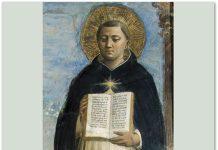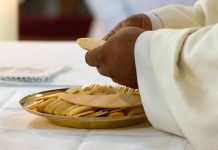The Eucharist is the greatest and most sublime of all the Sacraments. Although Baptism, from a certain point of view, deserves first place because it introduces us to the divine life, making us children of God and sharers in His nature, the Eucharist surpasses it in terms of substance, because it is the true Body, Blood, Soul and Divinity of Our Lord Jesus Christ.
Newsdesk (04/06/2024 8:38, Gaudium Press) The Solemnity of the Most Holy Body and Blood of Christ was conceived to counteract the pernicious influence of certain heretical ideas that were spreading among the people, to the detriment of the true Faith.
As early as the 11th century, Berengary of Tours had openly opposed the Mystery of the Altar, denying transubstantiation and the real presence of Jesus Christ in Body, Blood, Soul and Divinity in the sacred species. According to him, the Eucharist was nothing more than holy bread, endowed with a special symbolism. And at the beginning of the 12th century, the heresiarch Tanquelmo spread his errors in Flanders, especially in the city of Antwerp, claiming that the Sacraments, and especially the Most Holy Eucharist, had no value whatsoever.
Although all these false doctrines had already been condemned by the Church, some of their nefarious echoes were still being felt throughout Christian Europe. So Urban IV did not think it superfluous to publicly censure them in order to remove all prestige and penetration.
The Eucharist becomes the centre of Christian life
From the moment that Urban IV issued the bull Transiturus de hoc mundo, establishing the solemn celebration of the feast of Corpus Christi throughout the Church, Eucharistic devotion blossomed with greater vigour among the faithful: the hymns and antiphons composed by St. Thomas Aquinas for the occasion – including the Lauda Sion, a veritable compendium of the theology of the Blessed Sacrament, called by some the creed of the Eucharist – came to occupy a prominent place in the Church’s liturgical treasury.
Over the centuries — under the breath of the Holy Spirit — popular piety and the wisdom of the infallible Magisterium have combined to create the customs, uses, privileges and honours that today accompany the Service of the Altar, forming a rich Eucharistic tradition.
Even in the 13th century, there were the great processions conducting the Blessed Sacrament through the streets, first in a covered ambo and, later, exposed in a monstrance. Here, too, the fervour and artistic sense of the various nations took great pains to create vessels that rivaled each other in beauty and splendour, to make appropriate ornaments and to lay immense floral carpets along the route of the procession.
Popes Martin V (1417-1431) and Eugene IV (1431-1447) granted generous indulgences to those who took part in the processions. Later, the Council of Trent – in its Decree on the Eucharist of 1551 – would underline the value of these demonstrations of Faith: ‘The holy Synod declares that it is a pious and religious custom, introduced into the Church of God, to celebrate every year with singular veneration and solemnity, on a festive and particular day, this exalted and venerable Sacrament, carrying it in processions through public streets and places with reverence and honour.
However, the Eucharistic love of the faithful people was not restricted to external manifestations; on the contrary, they were the expression of a deep feeling placed in souls by the Holy Spirit, in order to value the precious gift of Jesus’ sacramental presence among men, according to His own words: “And remember, I am with you always, to the end of the age” (Mt 28:20). The mystery of love of a God who not only became like us in order to rescue us from the death of sin, but also wanted, in an extreme of tenderness, to remain among His own, listening to their requests and strengthening them in their tribulations, became the centre of Christian life, the nourishment of the strong, the passion of the saints.
Saint Peter Julian Eymard, an ardent devotee and apostle of the Eucharist, expressed this heavenly ‘madness’ of the Saviour in remaining in the Sacrament of life for us in terms full of unction:
‘It is understandable that the Son of God, carried away by His love for man, should have made Himself man like him, for it was natural that the Creator should have an interest in the reparation of the work that came from His hands. That, out of an excess of love, the Man-God died on the Cross is also understandable. But what can no longer be understood, what amazes those who are weak in faith and scandalises unbelievers, is that the glorious and triumphant Jesus Christ, after having finished His mission on earth, still wants to remain with us, in a more humiliated and annihilated state than in Bethlehem or on Calvary’.
‘I have eagerly desired to eat this Passover with you’
The Eucharist is the greatest and most sublime of all the sacraments. Although Baptism, from a certain point of view, deserves first place because it introduces us to the divine life, making us children of God and sharers in His nature, the Eucharist surpasses it in terms of substance, since it is the true Body, Blood, Soul and Divinity of Our Lord Jesus Christ.
The very moment and solemn circumstances in which it was instituted indicate its importance and the veneration that Christ wanted to instil in the souls of His disciples for this marvellous Sacrament. For this He reserved the last few hours He had left to spend with the Apostles before He died, because “the last actions and words that friends do and say at the moment of parting are more deeply engraved in the memory and imprinted more strongly on the soul”.
In those moments – it could be said – His adorable Heart was beating with a holy haste to realize, in time, what He had contemplated from all eternity in His divine knowledge. His words, ‘I have eagerly desired to eat this Passover with you before I suffer’ (Lk 22:15), clearly reveal the Incarnate God’s ineffable yearnings of love for all people, the ‘multitude of brothers and sisters’ (Rom 8:29), for whom He was going to offer Himself that very night.
The Divine Master’s desire was that the mystery of his Body and Blood would be perpetuated for centuries to come: ‘Do this in remembrance of me’ (Lk 22:19). However, we must consider that long before the Incarnation, Divine Providence had multiplied the symbols and figures that would allow people to better understand and love this Sacrament.
In this regard, St. Thomas Aquinas says: “This Sacrament is especially a memorial of the Passion of Christ; and it was fitting that the Passion of Christ, by which He redeemed us, should be prefigured so that the Faith of the ancients might be directed towards the Redeemer.
The Saviour chose the night of Passover, the main Jewish feast, to leave humanity His legacy of love, implying that He Himself is the spotless Lamb, given over to death to take away the sins of the world, by whose blood the sentence of condemnation that had weighed on us since the fall of Adam and Eve would be removed.
Let us kneel before the Tabernacle!
What should be our attitude and our feelings of soul when we consider the extreme goodness of God made Man who, having become incarnate, did not abandon the creature redeemed by His Blood, but remains present, assisting and supporting all those who want to come close to Him?
Let us kneel before the Tabernacle or, better still, before the Monstrance, entrusting our entire being to Jesus in the Blessed Sacrament – our body with all its members and organs, our soul, with its powers, its qualities, and even our own miseries – and offer God the Father the divine Blood of His Son, shed on the Cross in reparation for our faults.
In a way similar to the rays of the sun that fall upon our face and leave it flushed and glowing, so too, before the Blessed Sacrament, our soul receives a renewed infusion of graces, inviting us to abandon ourselves completely into the hands of Jesus, through Mary. In this way, our souls will be transformed towards the holiness to which God calls us.
And if at any time the difficulties of life make us feel discouraged or dry, let us remember these touching words from Fr. Faber:
“Often, when a man is seized with despair and assailed by questions, doubts, discouragements and uncertainties in considering his life, and feels surrounded by enemies, who howl around him like furious beasts, then an impulse, which is a grace, leads him to kneel before the Blessed Sacrament and, without his making any effort, behold, all those clamours sink into silence. The Lord is with him: the waves have calmed down, the storm has subsided and the journey will end directly at the desired point. It took no more than a glance at Jesus’ face for the clouds to dissipate and the light to appear. The splendour of the Tabernacle reappears like the sun”.
Text taken, with adaptations, from Heralds of the Gospel Magazine no. 90, June 2009. By Sr. Clara Isabel Morazzani Arráiz, EP.
Compiled by Roberta MacEwan


































